- Home
- Peter Benchley
Beast Page 12
Beast Read online
Page 12
It was a Saturday; he was off duty and had hoped to go diving with Whip Darling. But when he had called at eight that morning, Darling had told him that he and Mike intended to chip paint all day. Sharp had offered to help, but Darling had said no, they’d be working in a tight hold in the stern of the boat, nowhere near big enough for three people.
Sharp had read for an hour and then, at eleven o’clock, had found himself scanning the titles in the video store. He had looked at his watch and realized, with a feeling of depression bordering on nausea, that in order to get through the rest of Saturday he would have to rent not one, not two, but at least three movies.
This is your life? he had said to himself. Deciding between National Lampoon’s Christmas Vacation and Look Who’s Talking! Is all that’s left to you a choice between spending your time with an infantile adult or a smartass infant? What would Karen say? She’d say, Live, Marcus. Go rob a bank, fly a plane, trim your toenails, anything. Just do something!
He had walked out of the video store and tried to find a tennis game, but all the tennis players he knew were playing soccer, and he didn’t like the game: It was all technique with little result; he liked high-scoring games. He had called a couple of dive-tour operators; the boats had all left for the day. He had volunteered to take a helicopter up; none was available.
So he had gone to the beach, impelled, he guessed, by some vague hope that he might meet a girl worth talking to, having lunch with, maybe even making a date with to go dancing. Not that he knew how to dance, but anything was better than sitting around the Bachelor Officers Quarters watching reruns of Cagney & Lacey.
It had been a mistake. As he sat on the beach and watched children frolic in the wave wash and couples stroll along and families picnic under palm trees, he had felt more and more lonely, more and more hopeless. He wondered if there were any singles clubs on the island. Maybe he should become a lush and join Alcoholics Anonymous, just for the company.
He had seen two girls with potential, American tourists, pretty and vivacious, wearing bikinis brief enough to stir interest but not so brief as to announce that they were on the prowl. They had even stopped and spoken to him. Why, he wasn’t certain; possibly because he looked safe: thirtyish, and obviously not a self-styled stud, what with his workingman’s tan—all white except for his arms and face. One had fair skin and red hair, the other was deeply tanned and raven-haired.
He had wanted to talk to them; his mind had flooded with conversational gambits—the navy, helicopters, shipwrecks, diving, Bermuda. But he was out of practice in the dating game, and after he had answered their questions about moderately priced restaurants in Hamilton, he had let them get away. Within five minutes, of course, he had thought of several stratagems that might have intrigued them, and he cursed himself as a dim-witted fool.
Perhaps they’d go in the water, and he’d have a second chance. He’d go in nearby and, as the locals would say, have a go at chatting them up.
Then he thought: Why bother? What would it accomplish? He didn’t feel driven by his glands. He didn’t feel driven by anything.
And that, brother, he had concluded, is your problem.
Sharp looked at the water and saw, a hundred yards offshore, a wind-surfer trying valiantly to catch a puff of breeze and sail a few feet. But there was no breeze, so he kept toppling over backward and dragging the sail down on top of him.
Sharp wondered how deep the water was out where the guy was wind-surfing. Whatever had destroyed that boat and killed the divers was in deep water.
Sharp found it interesting that there had been no panic, especially after the paper had quoted that dippy woman word for word and included all her idiotic claims about a sea monster. People were still swimming, still sailing, still wind-surfing. He had been in his teens when Jaws had swept the States, and he had vivid memories of parents refusing to let their children get their feet wet, of beaches being closed and of otherwise rational adults declining to swim in water over their heads … in lakes.
Perhaps the current lack of panic could be attributed to lack of knowledge. No one knew what kind of thing might be out there, but it wasn’t a shark and it wasn’t a whale, so there wasn’t even credible speculation. Sharp suspected that Whip would have an idea, but Whip wasn’t a man to make guesses. Guesses, Whip would say, were a waste of time and energy.
Sharp was hungry, and so he got to his feet and started toward the concession stand. He was about to turn into the trees when he saw the two American girls. They were tying their hair back with rubber bands. They saw him watching them, and they waved at him, ran into the water and began to swim.
Okay, he thought, what the hell… . He’d wait till they stopped swimming, then he’d go in and swim out to them and try to think of something clever to say.
When they were thirty or forty yards offshore, the girls stopped and treaded water. Their heads were three or four feet apart, and they were talking and laughing.
Sharp walked down to the water’s edge. He saw one of the girls wave, and he waved back.
The girl waved again, with both hands, and then she disappeared underwater, and now the other one was waving, too, and shouting. No, not shouting, Sharp realized. Screaming.
“Omigod,” he said, and he took a couple of running steps and dove into waist-deep water and swam, sprinting. He churned the water, breathing only every third or fourth stroke.
He looked up to get his bearings; he was almost there. He saw the redheaded girl flailing and shrieking, and every time she raised her arms out of the water she’d sink. The other girl was trying to get to her, to get under her windmilling arms, to grab her and stop her hysterics.
Sharp swam up behind the redhead and pinned her arms to her sides and wrapped his arms around her and leaned back, kicking to keep himself afloat and her head out of water. He looked for the shark, the barracuda, the man-o’-war. He looked for blood.
“I’ve got you,” he said. “You’re okay. Calm down, it’s okay.”
The girl’s shrieks were subsiding now into sobs.
“Are you hurt? What happened?”
The other girl said, “She just all of a sudden started screaming and waving her arms.”
Sharp felt the girl relax, and he released his grip and put a hand under her back to keep her afloat.
“Something …” she said.
“Bit you?” Sharp asked.
“… horrible and slimy and gross …”
“What, stung you?”
“No, it …” She rolled over and clung to Sharp, weeping and almost sinking him.
Sharp said, “Let’s get you to shore.” He took one of her arms, and gestured for the other girl to take the other arm. Together they sidestroked toward shore, holding the girl between them. Soon they could touch bottom.
The girl said, “I’m okay. I just … it was …” She looked at Sharp and, trying to smile, said, “Thanks.”
“Back in a minute,” Sharp said, and he turned toward deep water and swam an easy breaststroke. When he gauged that he had reached the spot where the girls had been, he stopped swimming and spun in a slow circle, searching the water. He didn’t know what he was looking for. Box jellyfish didn’t exist in Bermuda; there were no sea wasps. Besides, the girl was unhurt, just scared. There were Portuguese men-o’-war, but they were unmistakable: Their purple bladders floated on the surface. He supposed there were big, harmless jellyfish that hung under the surface, but she’d have seen them, parts of them would have stuck to her.
He started for the shore, slowly, breaststroking, and then his hand touched something; he jerked upward, backpedaled. He looked at the water where his hand had been. There, a foot underwater, was something creamy white and roundish, about the size of a watermelon. Gingerly, he reached forward and touched it. It was slimy, ragged, pulpy. It felt like rotten meat. He put his hand under it. The underside was hard and slick. He brought it to the surface, and as soon as the air touched it, his nostrils were assailed by a vile smell of put
refaction that made his eyes water.
It wasn’t meat, it was fat. Blubber. Pinkish white and shredded.
He rolled it over. The skin side was blue-black and newly scarred, near the middle, with a circle, five or six inches across, of what looked like cuts. In the center of the circle was a single deep gash that went all the way through the skin and into the blubber. On one of the edges was half of another circle.
“Sweet Jesus …” Sharp said.
Pushing the thing ahead of him, he swam to shore.
On the beach, the children were gathered around something that had washed up. They were prodding it with a stick and pushing one another toward it and saying “Yuk!” and “Gross!”
Sharp looked at it and realized that it was another piece of blubber, smaller, with two half-circles, one on either end.
As he turned away, a parent came up to the children and saw what they had and said, “Holy shit!” and then called, “Hey, Nelson, come looka this!”
Sharp held the thing as far away from his face as he could. The girls were sitting together, the redhead wrapped in a towel, the other’s arm around her shoulder.
“She’s okay,” said the dark-haired girl, smiling and adding, “We want to thank you. Can we—” The breeze carried the stench of Sharp’s prize to her. “What’s that?”
“Gotta go,” Sharp said. He scooped up his towel, wrapped the blubber in it, put on his sunglasses and walked up to the lot where he had left his motorbike.
18
DARLING AND MIKE were on their knees in the after hold of the Privateer, sanding away the rough edges around the paint they had chipped. They wore surgical masks to keep the paint dust out of their lungs, and goggles to protect their eyes.
Darling had owned the boat for six years, and the hull had held up well. There weren’t any significant leaks, even around the stuffing box, but the hold trapped humidity, and humidity and salt air eventually ate through everything.
He was in a foul mood. He hated chipping paint, would much prefer to have let the yard do it when the boat was hauled out for bottom-painting in the fall. But the yard was charging forty dollars per man-hour, and Darling was beginning to wonder if he’d even be able to afford to have the boat pulled up on the slip so he could paint the bottom.
He felt the boat dip slightly as a weight came aboard, heard footsteps on the deck above. He looked up and saw Sharp standing by the open hatch. “Hey, Marcus …”
“Sorry to interrupt.”
“Don’t be. I’d welcome Lucifer himself to get me away from this godforsaken work.”
“Could you look at something for me?”
“You bet.” Darling removed his mask and goggles and started up the ladder.
Mike kept sanding until Darling said, “Come look, Michael boy. Don’t miss a chance for a breather.”
Sharp had set the bundle on a cutting table amidships and was standing away from it, to avoid the smell.
As Darling approached, the stench hit him, and he said, “Christ, lad! What you brung me, something dead?”
“Very,” Sharp said, and he told Darling what had happened at Horseshoe Bay.
Darling held an end of the towel while Mike unrolled it. Flies materialized from nowhere, and two gulls that had been sitting on the water rose up and began to circle over the boat.
“Whale,” Mike said.
Darling nodded. “Young, too.”
“What tells you that?” Sharp asked.
“The blubber’s thin; he hasn’t got his full ration yet. See how it goes to pink after a few inches?”
Mike said, “Sperm whale?”
“I warrant.”
“Prop got him?”
“No,” Sharp said. “Turn it over.”
Darling used a knife blade to flip the blubber. In the direct sunlight, the circle of marks shone like a necklace, and putrid flesh was oozing out of the slash in the center.
Mike and Darling looked at each other, then Darling said softly, “Son of a bitch …” He walked into the cabin, reached up on a shelf for something, then came back holding an amber-colored crescent claw. He slid the claw into the slash in the blue-black skin. It fit perfectly.
“Son of a bitch …” he said again.
Sharp said, “What is it, Whip? What did this?”
“I hope it isn’t what I think it is,” Darling said.
“What?”
Darling pointed to the blubber and said to Mike, “Drop that mess over the side, let the breams have a feed.” Then he turned to Sharp. “Come on.”
“Where to?”
“Need to consult a book or two.”
As Darling led the way up the path to his house, he noticed his daughter’s car in the driveway. “Dana’s here,” he said. “Wonder what about.”
Sharp had never been inside Darling’s house before, and he looked quickly around. It was a classic eighteenth-century Bermuda house, built like an upside-down ship. Sturdy wooden knees supported the ceilings; twelve-by-twelve beams braced the walls. The chests, cabinets, tables and floors were all of wide-board Bermuda cedar, relics of the days before the blight that killed all the cedar trees. The rooms were cool and dark and redolent of the rich spiciness of cedar.
The two women sitting in the dining room jumped when they saw Darling in the doorway.
The younger woman—tanned and sharp-featured, with sun-bleached hair—quickly shuffled the papers on the table before her, covering some with others.
Darling didn’t seem to notice. He said, “Hey, Lizard,” and went to her and kissed her on the cheek. “What brings you up here?”
“Plotting and planning,” she said. “What else?”
“That’s the way, keep the bastards at bay. You know Marcus Sharp? Marcus, this is Dana.”
“Know of you,” said Dana, and she smiled and shook Sharp’s hand.
“Nice to meet you,” Sharp said. He thought Dana looked uneasy, awkward. She kept her back to the table, blocking the pile of papers.
Darling led Sharp through the living room to a small room beyond, lined with bookcases and furnished only with a huge cedar desk and two chairs.
“I should be ashamed,” Darling said as he turned on a light.
“Why?”
“Putting my faith in science. The only thing scientists admit is what they know. What they don’t know—what might be, all the stuff in the realm of the possible but unproven—they dismiss as myth.”
Sharp let his eyes scan the titles on the shelves. It seemed that every book ever written about the sea was here, from Rachel Carson to Jacques Cousteau, Samuel Eliot Morison to Mendel Peterson, Peter Freuchen to Peter Matthiessen. And not only books about the sea, but books on coins, ceramics, glassware, shipwrecks, treasure, weaponry.
“Now let’s see.” Darling pulled a large cased volume from a shelf, and read the title aloud: “Mysteries of the Sea.” He removed the case, and opened the book.
“About ten years ago,” he said as he leafed through the pages, “I was on a boat in the Sea of Cortez with some aquarium people from California, helping them gather strange critters. One night, we saw some Mexicans fishing with lights, and we cruised over to have a look. They were jigging for big squid. Humboldt squid, four or five feet long, fifty or sixty pounds. I’d never seen the big ones before, so I decided to get in the water with them. As soon as my mask cleared, one of the bastards made a run at me. I swatted at him, and faster than I could believe, one of his whips shot out and grabbed my wrist. I thought a hundred needles were stabbing me. I punched him in the eye, and he let go, and I started up, figuring this wasn’t a healthy place to be. Then all of a sudden I felt myself being dragged down. Three of the goddam things had me, and they were yanking me down into the gloom. I tell you, the Lord must have a special place in His heart for stupid Bermudians, ‘cause everything they grabbed broke away: one of my flippers, my depth gauge, a collecting bag. I took off for the surface. For some reason, they didn’t chase me, and I got back on the boat. But I had nightm
ares for a month.”
“Jesus,” Sharp said.
Darling turned a page, then said, “There,” and pushed the book toward Sharp.
“What’s that?” Sharp asked as he stared at the picture on the page. It was a nineteenth-century woodcut of a hideous creature, a prehistoric-looking beast with a huge bulbous body that ended in a tail shaped like an arrowhead. It had eight writhing arms, two whips twice the length of the body and two gigantic eyes. In the picture, the beast was rising up out of the sea and destroying a sailing ship. Bodies were flying from the wreckage, and a woman, her eyes wide with terror, was hanging from the creature’s beak.
“That,” Whip said, “is the granddaddy of the critter that grabbed me. It’s Architeuthis dux, the oceanic giant squid.”
“Talk about nightmares. It can’t be real… can it?”
“It’s real, all right, rare but real.” Darling paused. “In fact, Marcus, it’s more than real. It’s out there now. It’s here.”
Sharp looked at Darling. “Come on, Whip… .” he said.
“You don’t believe me?” Darling said. “Okay. Maybe you’ll believe Herman Melville.” He reached up and pulled out a copy of Moby-Dick, and flipped through the pages until he found the one he wanted. Then he read aloud: ”’… we now gazed at the most wondrous phenomenon which the secret seas have hitherto revealed to mankind. A vast pulpy mass, furlongs in length and breadth, of a glancing cream-color, lay floating on the water, innumerable long arms radiating from its centre, and curling and twisting like a nest of anacondas, as if blindly to clutch at any object within reach.’ “
As Darling closed the book, Sharp said, “Whip, Moby-Dick is fiction.”
“Not altogether. The whale is fact, based on a real incident that happened to a ship called the Essex.”
“Still …”

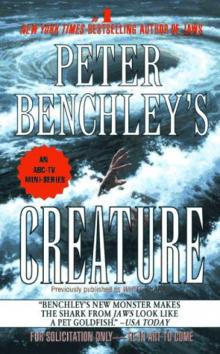 Peter Benchley's Creature
Peter Benchley's Creature The Island
The Island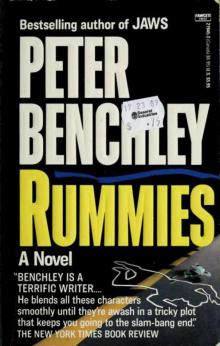 Rummies
Rummies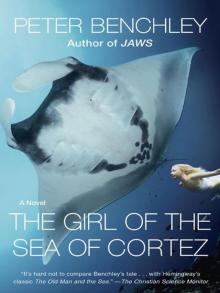 The Girl of the Sea of Cortez: A Novel
The Girl of the Sea of Cortez: A Novel Time and a Ticket
Time and a Ticket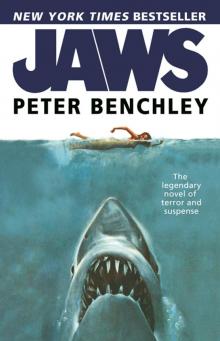 Jaws
Jaws The Deep
The Deep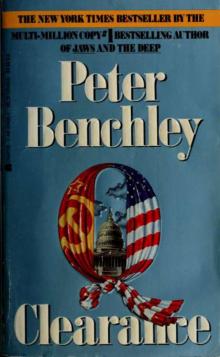 Q Clearance
Q Clearance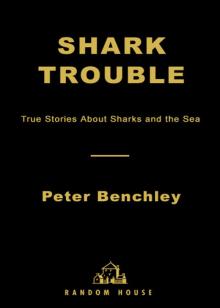 Shark Trouble: True Stories and Lessons About the Sea
Shark Trouble: True Stories and Lessons About the Sea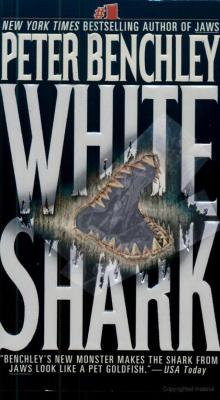 White Shark
White Shark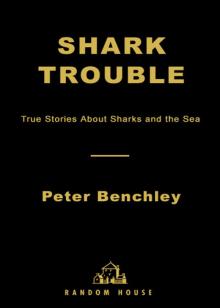 Shark Trouble
Shark Trouble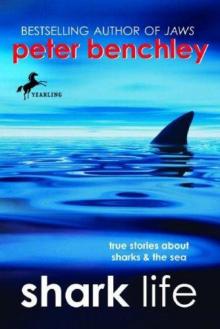 Shark Life: True Stories About Sharks & the Sea
Shark Life: True Stories About Sharks & the Sea